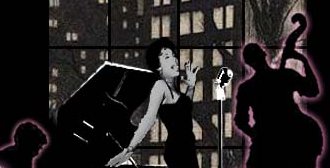Welcome toCafe SongbookInternet Home of the |
 |
 |
| Home || Songs || Songwriters || Performers || Articles and Blogs || Glossary || About Cafe Songbook || Contact/Submit Comment | |
| Search Tips: 1) Click "Find on This Page" button to activate page search box. 2) When searching for a name (e.g. a songwriter), enter last name only. 3) When searching for a song title on the catalog page, omit an initial "The" or "A". 4) more search tips. | |
| Portions of this page have not yet been completed. Thank you for your patience. | |||
Moonlight Becomes You |
|||
Written: 1942 |
Music by: Jimmy Van Heusen |
Words by: Johnny Burke |
Written for: Road to Morocco |
| Page Menu | |||
| Main Stage || Record/Video Cabinet || Reading Room || Posted Comments || Credits | |||
On the Main Stage at Cafe Songbook | ||
(Please complete or pause one video before starting another.) |
Willie Nelsonperforming "Moonlight Becomes You"on The Tonight Show with Jay Leno Nelson recorded "Moonlight Becomes You" as the title track on his 1993-94 album (rereleased 2000)-- personnel on the album includes Paul Buskirk, mandola; Johnny Gimble fiddle; Freddie Powers, rhythm guitar; and Dean Reynolds, bass
More Performances of "Moonlight Becomes You" |
|
Cafe Songbook Reading Room"Moonlight Becomes You" |
||
| About the Movie Road to Morocco and the Origins of the Song | ||
|
When lyricist Johnny Burke arrived in Hollywood in 1935 (for the second time) he went to work for Paramount in what turned out to be a lifetime job, writing the songs, all toll, for forty-one of the studio's movies. He first collaborated with Arthur Johnston, then with James Monaco. When the older Monaco left Paramount for Fox, Burke got paired with Jimmy Van Heusen, who had arrived in Hollywood from New York where he had been working on Broadway. The new team got as their first assignment the Crosby-Hope film Road to Zanzibar (1941). Van Heusen and Burke wound up writing the songs for all but one of the "Road" pictures, the second of which was Road to Morocco in 1942, in which "Moonlight Becomes You" outshines several other very good songs. The movie opens with two shipwrecked castaways on a raft. Jeff (Bing Crosby) and Orville, aka Turkey (Bob Hope) soon wash up on a beach without a clue as to where they are. A very sweet camel finds them and transports the pair out onto the dessert where a sign reading "Road to Morocco" supplies the clue to their whereabouts as well as their cue to sing the Van Heusen / Burke title song for the film.
By the time they've finished singing a couple of choruses of "Road to Morocco," they find themselves in a city where Hope's hand gets mysteriously caressed by a woman passing by hidden inside what looks like the royal rickshaw. The woman (Dorothy Lamour) is no less than a princess who fancies Hope, or at least his hand, and quickly arranges for her thuggish servants to get Crosby to sell Hope to them to satisfy the royal lust. Hope is soon cavorting with the princess, and Crosby, having spent the money, strolls through the town singing "Ain't Got a Dime to My Name," the movie's second song.
Bing is interrupted by a note that floats down from a palace window, in which Hope disingenuously pleads with him to "flea" for his life and forget about him. Crosby promptly ignores his buddy's request and discovers why Hope wants to get rid of him. The princess has Hope in bed, seducing him with the next Van Heusen / Burke song, "Constantly." Crosby tries to explain but Hope denies he knows him and attempts to get the princess's men to cart off the potential rival. Lamour, who apparently appreciates an assortment of men, saves Crosby, though she continues to fancy Hope. When Crosby, strolling on the palace grounds beneath her balcony, serenades her with "Moonlight Becomes You" her heart yields to Der Bingle.
The plot thickens when a handsome sheik (Anthony Quinn) arrives to claim the princess. The remainder of the film is devoted to the comic working out of all the troubles that ensue, mostly sans the singing. We do, however, continue to hear strains of "Moonlight Becomes You" here and there, including Lamour singing it when she appears as an apparition to the boys who are trying to escape across the desert. This comic version of the song morphs into a magical trio (Lamour, Crosby and Hope) during which the various voices switch from character to character, ending with what sounds like a chord á la The Boswell Sisters.
The song makes one last fleeting appearance as Hope hums it just before his cigarette sets off an explosion and sinks the ship that is transporting the four of them (the boys, Lamour and her maid) back to New York. In the final scene, they are all on what looks like the same raft used in the opening scene, this time, however, just off shore from Manhattan. Like so many other great songs that come from movies, "Moonlight Becomes You" gets recognized by the filmmakers right from the start. It or parts of it are reprised throughout the film to provide the movie with its musical unity. |
|
| back to top of page | ||
| Critics Corner | ||
| (This section is currently in preparation.) | ||
| back to top of page | ||
| Lyrics Lounge | ||
(This section is currently in preparation.) Click here to read Cafe Songbook lyrics policy. |
||
| back to top of page | ||
Visitor CommentsSubmit comments on songs, songwriters, performers, etc.
Feel free to suggest an addition or correction. Please read our Comments Guidelines before making a submission. (Posting of comments is subject to the guidelines. Not all comments will be posted.) |
| To submit a comment, click here. |
Posted Comments on "Moonlight Becomes You":
No Comments as yet posted |
| back to top of page |
Credits("Moonlight Becomes You" page) |
Credits for Videomakers of custom videos used on this page:
Borrowed material (text): The sources of all quoted and paraphrased text are cited. Such content is used under the rules of fair use to further the educational objectives of CafeSongbook.com. CafeSongbook.com makes no claims to rights of any kind in this content or the sources from which it comes.
Borrowed material (images): Images of CD, DVD, book and similar product covers are used courtesy of either Amazon.com
Any other images that appear on CafeSongbook.com pages are either in the public domain or appear through the specific permission of their owners. Such permission will be acknowledged in this space on the page where the image is used.
For further information on Cafe Songbook policies with regard to the above matters, see our "About Cafe Songbook" page (link at top and bottom of every page). |
This section is currently incomplete. The Cafe Songbook |
||
|
Performer/Recording Index
(*indicates accompanying music-video)
|
||
Year Music-Video
Notes: |
||
| back to top of page | ||
Year Music-Video
Notes: |
||
| back to top of page | ||
Year Music-Video
Notes: |
||
| back to top of page | ||
Year
Music-Video: Notes: |
||
| back to top of page | ||
Year Music-Video
Notes: |
||
| back to top of page | ||
Year Music-Video
Notes: |
||
| back to top of page | ||
Year Music-Video
Notes: |
||
| back to top of page | ||
Year Music-Video
Notes: |
||
| back to top of page |
| Home || Songs || Songwriters || Performers || Articles and Blogs || Glossary || About Cafe Songbook || Contact/Submit Comment | |
© 2009-2018 by CafeSongbook.com -- All Rights Reserved |

